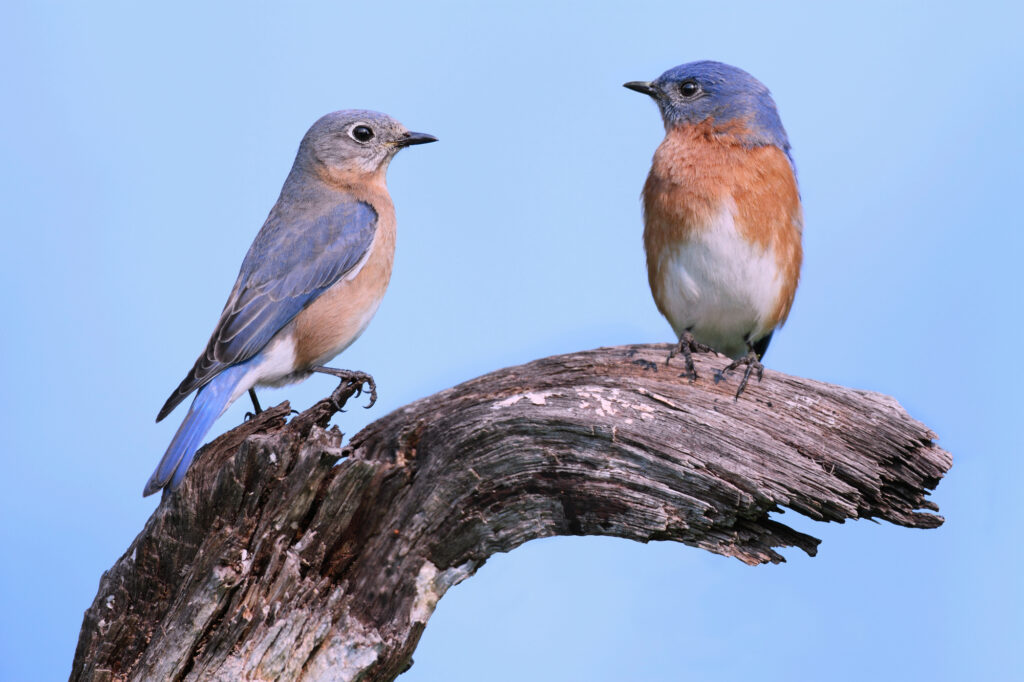Anyone with a passion for birdwatching has probably wondered: do hawks eat bluebirds?
Sure, nature has to take its course, but it’s still not fun to watch hawks and other predators prey on the smaller birds with fewer defenses. So what’s the answer? Yes! Hawks eat bluebirds.
Hawks belong to a category of birds called thrushes, which are prey birds for many raptors — hawks included. Here’s your complete guide to the hunting relationship between hawks and bluebirds.
What Type Of Hawk Eats Bluebirds?
Hawks are opportunistic feeders, who will take advantage of any meal they can get. So technically, any kind of hawk will eat a bluebird. However, some species are more likely to prey on them than others.
Cooper’s hawks are one species that have been known to eat bluebirds. Native to North America, this hawk ranges from southern Canada to northern Mexico.
Cooper’s hawks are medium-sized hawks, with a body length of about 16 inches and a wingspan of up to 36 inches. It has a rounded head, with red eyes and a white throat. The back and upper wings are blue-gray, while the underparts are light gray with dark streaks. The tail is long and pointed, with bands of dark and light colors.
The Cooper’s hawk primarily eats small birds, such as bluebirds, but it will also eat mammals, reptiles, amphibians, and insects. However, it should be noted that any hawk will eat basically anything they can catch.
Do Hawks Eat Baby Bluebirds?
So now that we know that some hawks eat bluebirds, you may also be wondering: do hawks eat baby bluebirds?
It is a common belief that hawks prey on vulnerable baby bluebirds, but is there any truth to this? While it is certainly possible that a hawk could kill and eat a young bluebird, it is not their preferred diet.
Hawks are actually quite fussy eaters, and they typically avoid anything that does not meet their strict standards. Baby bluebirds are usually too small and lack the feathers and muscle that hawks prefer. In addition, bluebirds typically nest in small cavities, which can be difficult for hawks to access.
As a result, it is unlikely that hawks would target baby bluebirds as their primary source of food. However, if a hawk was feeling particularly hungry or desperate, they’ll likely go after an easy meal.
Do Hawks Eat Bluebird Eggs?
Despite hawks not favoring bluebirds as a primary source of food, hawks will eat bluebird eggs. When it comes down to it, hawks will always take advantage of an easy meal. And there’s no easier meal than an unguarded bluebird egg.
Unfortunately, for bluebird populations, it can take years for their populations to recover once hawks hone in.
Thankfully, there are ways to help protect bluebird nests from hawks. One method is to put up a physical barrier, such as a wire fence, around the nest. This will deter hawks from being able to access the eggs.
Another method is to use bright lights or loud noises to scare hawks away from the area. By taking these precautions, we can help to ensure that bluebird populations remain healthy and thrive for years to come.
Bluebirds And Their Predators
Bluebirds are prey birds who have a long list of foes, in addition to hawks. Common bluebird predators include things such as cats, nest parasites, snakes, and house wrens — especially house wrens.
While cats and other bluebird predators see the birds as a nice, quick meal, the beef between bluebirds and house wrens is a little more personal.
See, house wrens have been recorded being especially cruel to bluebirds, not for food purposes, but basically, just because they can.
While it’s true the house wrens and bluebirds are both cavity nesters, who must take advantage of pre-existing cavities or nests in order to raise their young, their aggression towards bluebirds also doesn’t stop there.
Sure, they’ll either chase away or kill bluebirds for their nests, but researchers have also observed them sneaking into nests and poking holes in bluebird eggs for no other reason than malice. Althea Sherman, a self-taught ornithologist, recorded extensive observations of aggressive house wrens as far back as the early 20th century.
Sherman was so taken aback by their behavior that she wrote the birds in question about of her will. Talk about principles! Unfortunately, bluebird predators aren’t limited to just only other animals.
Bluebirds also have to combat the devastating effects of habitat loss and pesticide use.
Conclusion
In conclusion, yes, hawks have been known to go after bluebirds if food sources are scarce. However, other predators don’t have those same caveats. To them, bluebirds are tasty meals under any circumstance.
But before you get too sad, just know that predation is the nature of the world, and there’s nothing you can really do about it. Besides, there are plenty of insects that feel the same way about bluebirds.
On the bright side, there are things that you can do to help ensure the bluebird population continues to thrive, like investing in the bluebird feeders we’ve compiled in this list!

